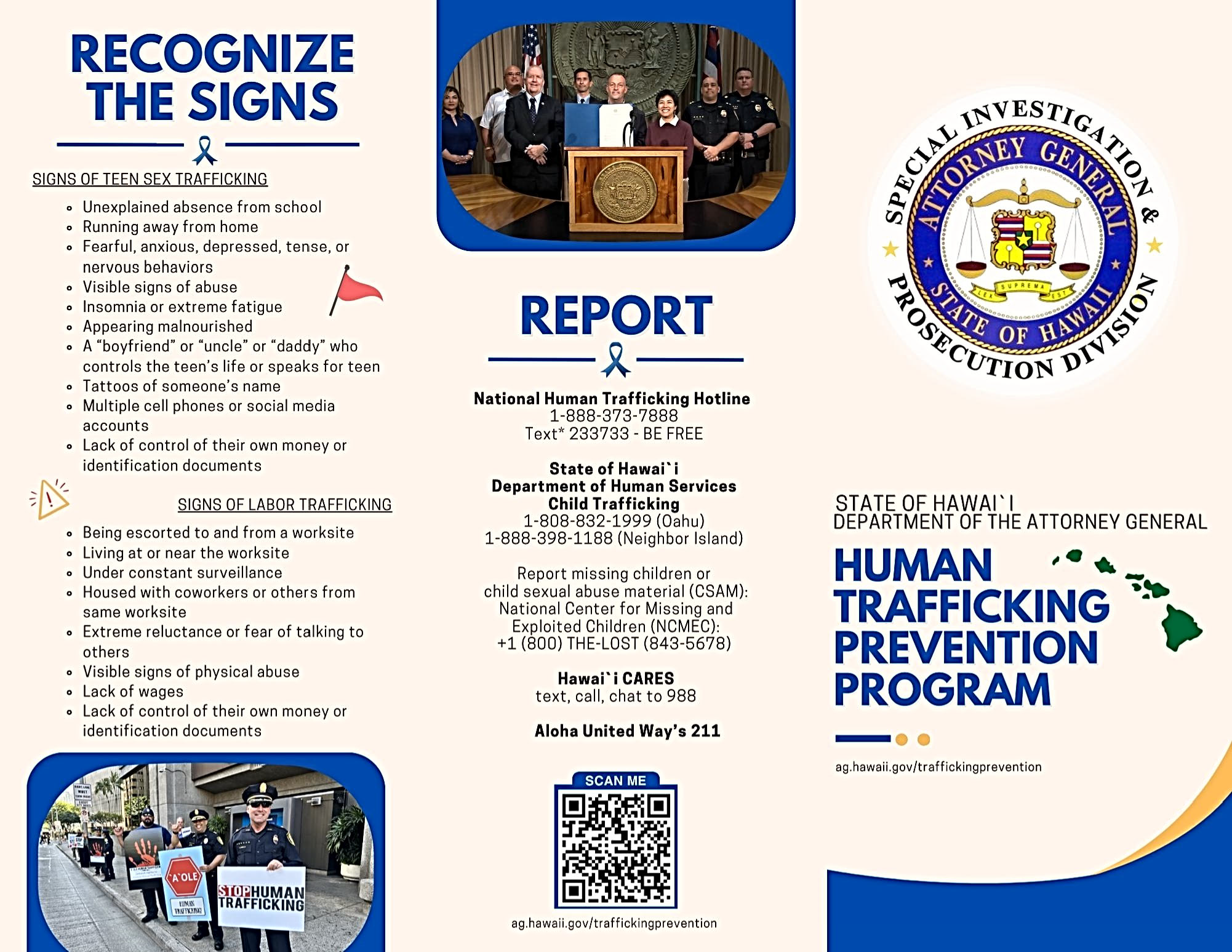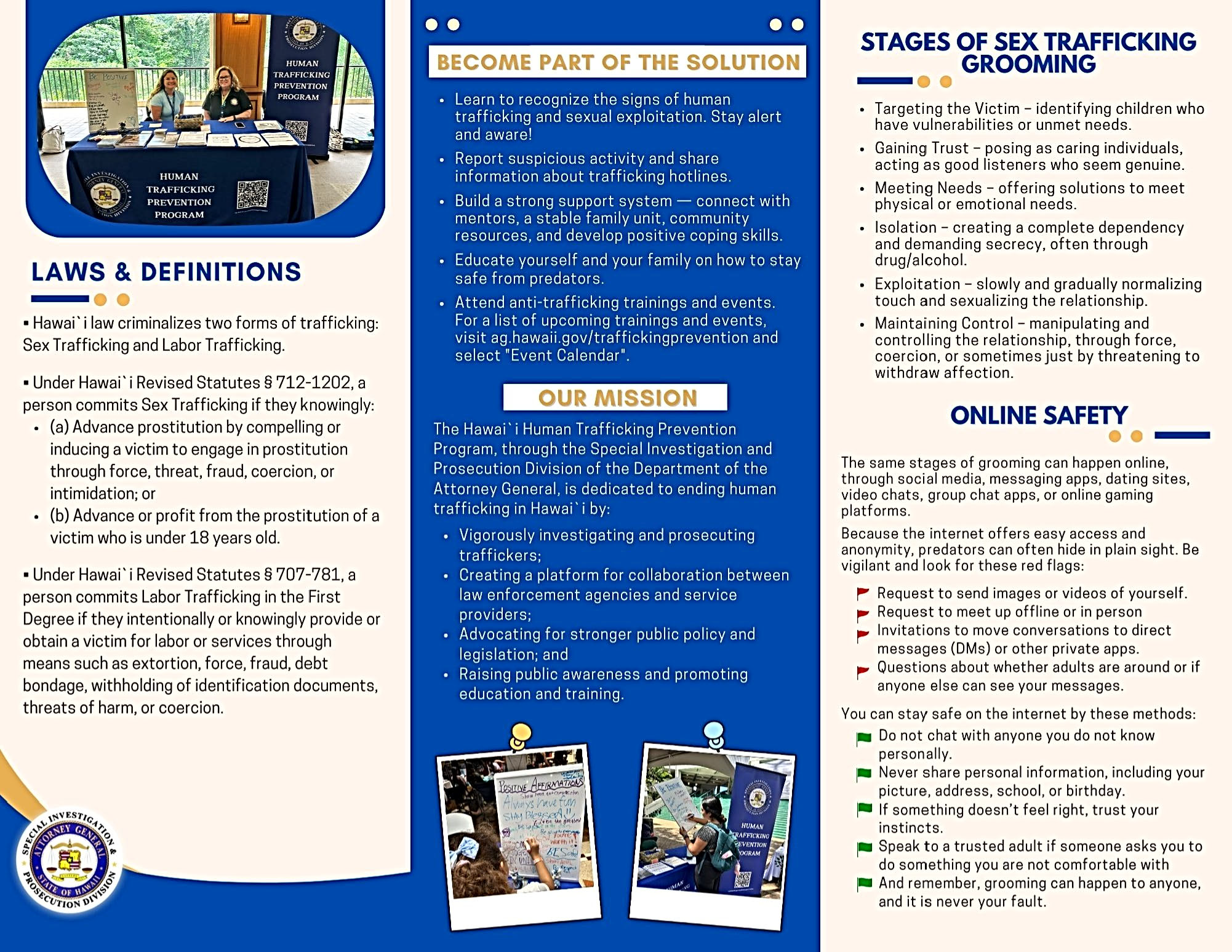Human Trafficking Prevention Program
The Hawai‘i Human Trafficking Prevention Program is dedicated to addressing the needs of human trafficking victims through the development and implementation of comprehensive statewide strategies. These strategies focus on preventing trafficking, assisting victims, raising public awareness, and providing specialized training to empower communities and stakeholders in combating this critical issue.
The Special Investigation and Prosecution Division is composed of the Human Trafficking Abatement Section, as well as the Corruption, Fraud, and Economic Crimes Section. One of the division's core missions is to investigate and prosecute human trafficking cases.
The Human Trafficking Abatement Section consists of three Deputy Attorneys General and a Human Trafficking Abatement Coordinator. The Human Trafficking Abatement Coordinator is responsible for fulfilling the requirements outlined in Act 83 (2023), which established the Human Trafficking Prevention Program within the Department of the Attorney General. This requires working alongside service providers, governmental agencies, and federal, state and local law enforcement.
In the United States, the 3P framework underpins the Trafficking Victims Protection Act (TVPA) of 2000, which lays out measures for prosecuting traffickers, protecting victims, and preventing human trafficking through public awareness and training. This framework has been instrumental in setting standards for anti-trafficking efforts both nationally and internationally.
However, recognizing that combating trafficking requires more than these three core principles, experts and advocates have introduced additional components to enhance the effectiveness of anti-trafficking strategies:
4th “P”: Partnership
Partnership brings together diverse stakeholders, government agencies, non-governmental organizations, the private sector, and community organizations—each playing a role in a comprehensive anti-trafficking response. This element fosters collaboration and resource sharing across sectors, making efforts more efficient and effective. Partnerships allow organizations with specialized expertise to contribute in ways that complement each other. For instance, law enforcement may work with social services to support survivors, while community groups may assist in raising awareness and reaching at-risk populations. A collaborative, inclusive approach to combating trafficking strengthens each “P” and amplifies efforts to achieve common goals.
5th “P”: Policy
Policy shapes the legal and operational landscape for addressing trafficking by establishing a human rights-centered framework. Effective policies translate anti-trafficking principles into action through legislation, regulation, and practical guidelines. By incorporating a human rights focus, policy ensures that efforts to combat trafficking uphold the dignity and rights of all individuals, especially survivors. Policies clarify roles and responsibilities within partnerships, creating accountability and cohesion across organizations, and help establish clear, enforceable standards for prosecution, victim support, and preventive measures. Robust policies also facilitate training, capacity building, and data sharing, providing a stronger foundation for anti-trafficking initiatives across all sectors.
In summary, while the 3P framework of prosecution, protection, and prevention remains fundamental, the addition of partnership and policy further strengthens anti-trafficking efforts. Partnership fosters collaboration across diverse stakeholders, maximizing resources and outreach, while policy reinforces a human rights-centered approach and provides the legal and practical tools to implement these efforts effectively. The expanded “5P” paradigm thus represents a comprehensive, modernized approach to combating human trafficking, adaptable to the evolving landscape of this global challenge.
- Participate in events during National Human Trafficking Awareness Month – January.
- Learn and share how to spot the signs and indicators of human trafficking and sexual exploitation.
- Learn how to recognize traffickers’ recruitment tactics, how to safely navigate out of suspicious or uncomfortable situations, and where to reach out for help.
- Report a trafficking tip and share trafficking tip lines and hotlines.
- Become a mentor to a young person or someone in need.
- Share a missing person poster.
- Learn ways to protect you and your family from online predators.
- Understand your local resources that help to prevent trafficking and support survivors.
- If you see something, say something.
- Self-care
- Self-regulation
- Self-efficacy
- Self-esteem
- Positive coping skills
- Faith or spirituality
- Having a mentor
- Connected to a community
- Strong support network
- Stable family unit
- Community resources
- Programs that meet basic needs
- Vision or goals for the future
- Health care and childcare
- Services addressing trauma and abuse
- Services addressing marginalization
- Stable housing
- Ability to recognize healthy and unhealthy situations and behaviors
- Survival skills
- Online safety and support
- Educating and empowering youth and young adults
- Having at least one trusted adult
If there is an emergency, call 911. Do not submit a tip to SIPD.
SIPD accepts tips about crimes relating to human trafficking. To submit a tip to SIPD, please click here.
To report child trafficking, call the State of Hawaiʻi Department of Human Services Child Trafficking (Child Welfare Services):
https://humanservices.hawaii.gov/ssd/home/child-welfare-services/
Child Trafficking: 808-832-1999 (Oahu)
Child Trafficking: Toll-free 1-888-398-1188 (Hawai`i Island, Moloka`i, Lana`i, Kaua`i) Available 24 hours a day, 7 days a week
Hawai`i CARES – text, call, chat to 988. Hawai‘i CARES 988 is a resource to help with crisis, substance use, suicide, and mental health. Local caring crisis counselors are here to support you.
https://hicares.hawaii.gov/
https://hicares.hawaii.gov/resources/resource-library/
Aloha United Way’s 211 service is Hawai’i’s only comprehensive statewide information and referral helpline. 211 Specialists are specifically trained to help you find food, shelter, financial assistance, childcare, parenting support, kūpuna care, disability services, and health services related to COVID-19 and vaccinations.
https://www.auw.org/211-hawaii
National Hotlines:
The National Human Trafficking Hotline works closely with service providers, law enforcement, and other professionals in Hawai`i to serve victims and survivors of trafficking, respond to human trafficking cases, and share information and resources.
If you believe you are a victim of human trafficking or may have information about a potential trafficking situation, please contact the U.S. National Human Trafficking Hotline.
You can also email the National Human Trafficking Hotline at [email protected].
You can find more information here:
https://humantraffickinghotline.org/en/report-trafficking
https://humantraffickinghotline.org/en/get-help
https://humantraffickinghotline.org/en/chat
You can also text the National Human Trafficking Hotline at 233733 – BE FREE or chat with someone at the National Human Trafficking Hotline – text and data rates may apply.
Callers can dial 711 to access the Hotline using TTY.
1-888-373-7888
TTY: 711
Text* 233733 – BE FREE
Homeland Security Investigations (HSI) Tip Line: +1 (866) 347-2423 (24/7).
TTY for hearing impaired only: (802) 872-6196.
Report missing children or child sexual abuse material (CSAM) to the National Center for Missing and Exploited Children (NCMEC): +1 (800) THE-LOST (843-5678).
https://www.missingkids.org/home
If your organization or civic group would like more information about human trafficking, please contact our office by email at [email protected] or by phone at 808-460-5347.

